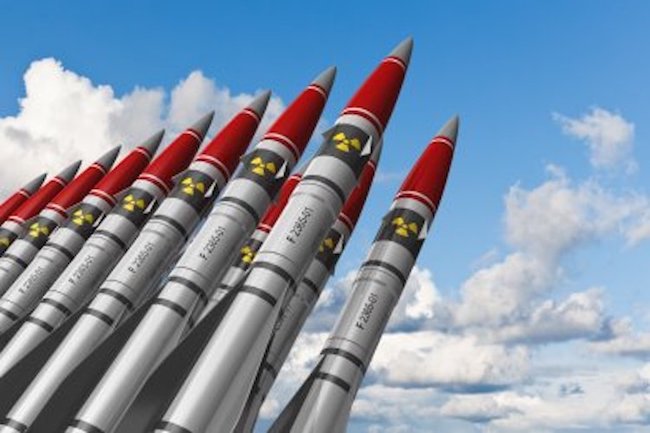By Jutta Wolf

BERLIN (IDN | PNND) – Fifty Parliamentarians from 13 European countries have sent a letter today NATO Secretary-General Jens Stoltenberg and Chair of the OSCE Minister Sebastian Kurz, urging these two key European security organizations to pursue dialogue, détente and nuclear risk reduction in Europe.
The letter on July 14 also calls on NATO and OSCE (the Organization for Security and Co-operation in Europe) to support the multilateral process for nuclear disarmament through the Non-Proliferation Treaty and the United Nations. OSCE is the world’s largest security-oriented intergovernmental organization. Its mandate includes issues such as arms control, promotion of human rights, freedom of the press, and fair elections.
The letter, organized by members of the Parliamentarians for Nuclear Nonproliferation and Disarmament (PNND), comes in the wake of UN negotiations which achieved the adoption of a Treaty on the Prohibition of Nuclear Weapons on July 7. It also follows the adoption by the OSCE Parliamentary Assembly on July 9 of the Minsk Declaration, which calls on all countries to participate in UN negotiations on nuclear disarmament and to pursue the adoption of nuclear risk reduction, transparency and disarmament measures.
“We are extremely concerned about the deteriorating security environment in Europe, and an increase in nuclear threat postures including in planning and preparing for the possible first-use of nuclear weapons,” said Roderich Kiesewetter, member of the German Parliament and one of the initiators of the joint parliamentary letter.
“Although this situation has been aggravated by illegal Russian actions against Ukraine, and we must uphold the law, we must also remain open to dialogue and détente in order to reduce threats and open the door to resolving conflicts,” Kiesewetter said.
“The threat of a nuclear exchange by accident, miscalculation or even intent has returned to Cold War levels,” said Baroness Sue Miller, PNND Co-president and a member of the UK House of Lords. “These two initiatives are imperative to avert a nuclear catastrophe. Not all European countries will be able to support the nuclear prohibition treaty yet, but they should all be able to support immediate action on nuclear risk reduction, dialogue and détente.”
“The increase in military expenditures worldwide and the modernization of nuclear arsenals by all nuclear armed states are taking us in the wrong direction,” said Dr. Ute Finckh-Krämer, Member of the German Parliament Committee on Foreign Affairs. ‘Many disarmament and arms control treaties that have been adopted in the past 30 years are now at stake. We have to do all that is possible to uphold and implement them.”
The joint parliamentary letter outlines seven politically feasible actions that NATO and OSCE member countries can take, including:
Reaffirming a commitment to the rule of law;
Affirming the non-use of weapons of mass destruction which impact on the rights and security of civilians;
Declaring that nuclear weapons would never be used against non-nuclear countries;
Keeping open various channels for dialogue with Russia including the NATO-Russia Council; affirming the historical practice of non-use of nuclear weapons;
Supporting nuclear risk-reduction and disarmament measures between Russia and NATO; and
Supporting multilateral processes for nuclear disarmament including through the Non-Proliferation Treaty and the 2018 UN High Level Conference for Nuclear Disarmament.
“The OSCE demonstrates that it is possible to have dialogue, uphold the law, protect human rights and security, and reach agreements between Russia and the West,” said Ignacio Sanchez Amor, member of the Spanish Parliament and Chair of the OSCE General Committee on Democracy, Human Rights and Humanitarian Questions. “In difficult times like now, it is even more important for our parliaments and governments to use these approaches, in particular to prevent a nuclear disaster.”
“The adoption of the nuclear prohibition treaty by the United Nations on July 7 was a positive step to strengthen a norm against the possession and use of nuclear weapons,” said Alyn Ware, PNND Global Coordinator. “However, only non-nuclear States currently support this treaty. Action on nuclear risk-reduction and disarmament measures by nuclear armed and allied countries must therefore take place bilaterally and through the OSCE, NATO, Non-Proliferation Treaty and the 2018 UN High-Level Conference on Nuclear Disarmament.”
“Recent UN High-Level Conferences have been very successful, resulting in the achievement of the Sustainable Development Goals, adoption of the Paris Agreement on Climate Change and the adoption of the 14 Point Action Plan to Protect the Oceans. The High-Level Conference on Nuclear Disarmament could be the place to affirm or adopt key nuclear risk-reduction and disarmament measures,” Ware added. [IDN-InDepthNews – 15 July 2016]
Photo credit: PNND
IDN is the flagship of International Press Syndicate.
facebook.com/IDN.GoingDeeper – twitter.com/InDepthNews






